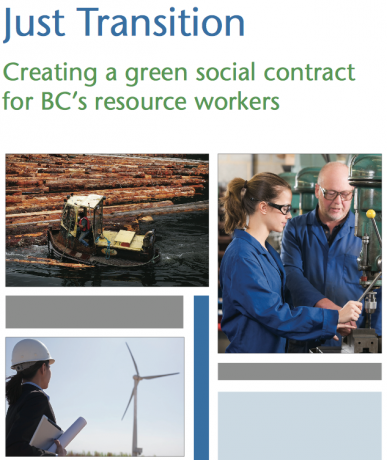Reports
You are here
Just transition: the social contract that can’t be ignored

March 1, 2015
“At BC’s carbon crossroads there is a choice to be made: dig deeper into fossil fuels through LNG or reduce carbon emissions to something close to zero within a few decades.” But what does that mean for workers and their families in the coal, oil and natural gas industries?
In their recently released study Just Transition: Creating a green social contract for BC’s resource workers, the Canadian Centre for Policy Alternatives takes on the “jobs vs the environment” false dichotomy, and outlines policies that can unite climate justice and the labour movement.
As they explain, “In the Canadian Labour Congress definition, just transition is ‘the fair treatment of workers and their communities when employers close facilities,’ which includes an aim of ‘continuation of employment without loss of pay, benefits or seniority,’ and where this is not possible provision of ‘just compensation.’ This includes a vision of ‘quality employment in an economy based on sustainable production and infrastructure,…communities as centres of diverse, labour-intensive industries, with a strong public sector to support them and is above all, about alternative employment in a sustainable economy.” Just transition assumes a planning framework and specific programs.’”
While focusing primarily on British Columbia, this result of five years of industry research shines the spotlight on several major issues in the resource sector, including BC’s transition into a green-energy future. Central to this is shifting the focal-point away from short-term gains for corporate profit and into community and energy infrastructure that supports communities and respects First Nations.
From oil economy to green economy
Anybody who’s lived in an area that’s been hit by large corporate downsizing understands that a swift loss of jobs leeches it’s way into all facets of a community, such as school funding, tax revenue for local services, real estate prices and family wellbeing.
As the reports found through interviews with workers in the resource sector, the tar sands are a false promise: “The lure of work in Alberta’s tar sands was a refrain among participants, although there was also a feeling that high pay in Alberta did not correlate with a good quality of life. Workers would prefer to stay in their communities and united with their families, but when work is no longer available in the local community (or the only available work is for low pay), workers have had to leave their families behind for extended periods.” As one worker said, “we export our rocks, we export our logs, and we export our children.”
Instead, the report argues for a “green social contract to ensure a smooth transition to a zero-carbon economy.” The backbone of this initiative focuses on several key issues, such as investing long-term in employees, redressing financial instability levered on families from boom-bust cycles in their respective industries, and supporting alternative models to private ownership (including public ownership, worker ownership and new partnerships with First Nations). Just transition offers such solutions as alternative training of employees whose current skills are downsized, bringing early-retirement incentives to pave the way for new positions, strengthening Employment Insurance, and the creation of green-jobs (in renewable energy, energy efficiency and public transit) to tackle the threat of climate-change. This is all possible by collecting royalty payments from companies as part of a provincial plan to offer training for sustainable jobs in green-energy developments.
According to current data used in the study, investing in green-energy creates more jobs per-dollar than fossil fuels. What’s needed is to utilize the existing carbon-tax and natural-gas royalties in setting up the green-jobs that are the crux of this transition. Such a long-term investment is not only essential for bolstering environmental sustainability, but it will also help to support workers who have become far too dependent on fluctuating commodity-markets to have any real self-determining stake in their own welfare.
What’s the barrier?
This is clearly what we need to move BC’s infrastructure, environmental regulation and worker protection boldly into the 21st century, but what’s the barrier? The report harkens back to the earlier “social contract” after World War II: “While there has often been conflict between corporations, workers and government, in the post-WWII period there existed a ‘social contract’ that underwrite the good life for many rural communities. Unions were able to organize, leading to improvements in wages and working conditions…And taxes paid by corporations and workers flowed back in the form of a wide range of public services. In recent years that social contract has been greatly eroded in the name of ‘competitiveness,’ a vaguely defined attribute that typically means reducing taxes and regulations.
One of the many downfalls of neoliberalism has been its drive to concentrate economic power into the hands of multinationals driven by global competition in a workforce that only values the laws of supply and demand. As a result, the fate of many communities and families has hinged upon the objectives of these companies that are solely interested in making profit, with no social obligation to its employees.
But the earlier social contract emerged in the context of the post-war boom of capitalism, when profit rates could sustain broader social reforms. Neoliberalism emerged as an attempt to restore declining profit rates, which failed to prevent the current economic crisis. Years of government austerity measures, directed against workers and to siphon public funds away from public services into corporations, have failed to restore profit rates. This shows that to solve the climate crisis, in the midst of economic crisis, requires challenging the capitalist system that drives them both. Through the process of fighting for a just transition, uniting the labour movement with the climate justice movement, we can shift not only from an oil to a green economy but to a totally different economic system that respects people and the planet.
Section:









